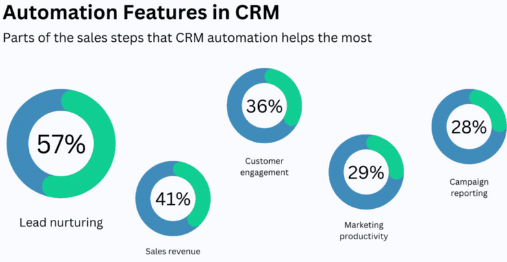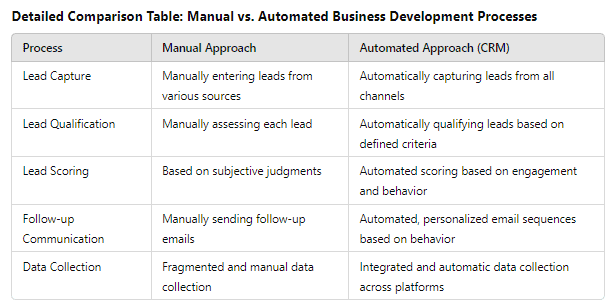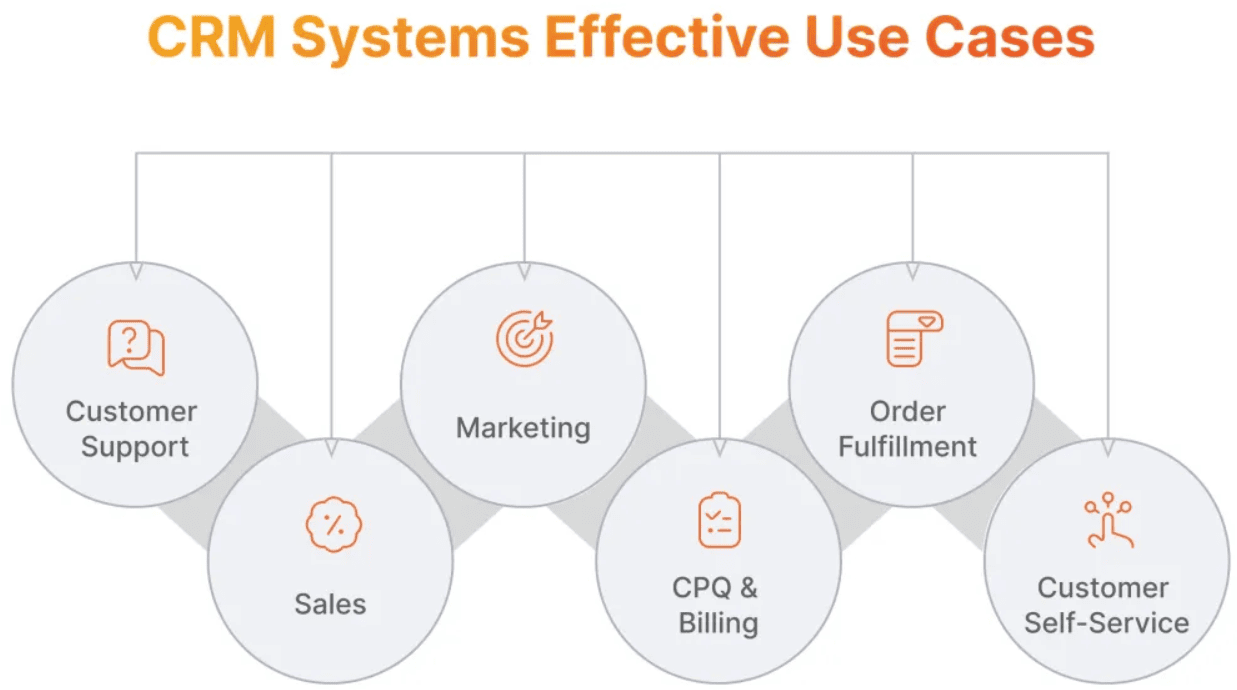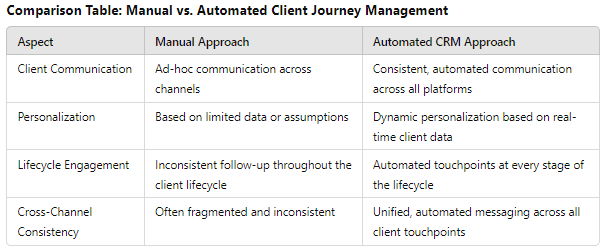
In today’s competitive business landscape, optimizing conversion rates and retaining clients are crucial for growth. One of the most powerful ways to achieve this is through CRM automations—customized workflows and data-driven systems that streamline tasks, enhance communication, and nurture relationships. For businesses leveraging CRM automation, particularly service-focused industries and consultancies, the impact is transformative, ensuring efficient operations and sustained client engagement.
At Erphub, we specialize in crafting tailored CRM solutions to meet the needs of service-oriented businesses, helping them automate key business development and retention activities. In this breakdown, we’ll explore how CRM automations can significantly boost conversion rates at critical business development and retention points.
The Significance of CRM Automations in Driving Business Growth
Business development and customer retention are the two pillars of sustained growth. While acquiring new clients is often the focus, retaining existing clients is equally important, if not more so. Studies have shown that increasing client retention by just 5% can boost profits by anywhere from 25% to 95%, emphasizing the importance of effective retention strategies.
CRM automations enable businesses to manage these key growth drivers with greater efficiency and precision. Instead of relying on manual tasks, businesses can automate critical activities such as lead scoring, nurturing, follow-ups, customer engagement, and even feedback collection. For service-focused industries and consultancies, where client relationships are critical, automation ensures a level of personalization and responsiveness that manual processes struggle to achieve.
The following sections delve deeper into how CRM automation can be leveraged to improve conversion rates in business development processes and retention strategies, making client relationships more scalable and sustainable.
Business development and customer retention are the two pillars of sustained growth. While acquiring new clients is often the focus, retaining existing clients is equally important, if not more so. Studies have shown that increasing client retention by just 5% can boost profits by anywhere from 25% to 95%, emphasizing the importance of effective retention strategies.
CRM automations enable businesses to manage these key growth drivers with greater efficiency and precision. Instead of relying on manual tasks, businesses can automate critical activities such as lead scoring, nurturing, follow-ups, customer engagement, and even feedback collection. For service-focused industries and consultancies, where client relationships are critical, automation ensures a level of personalization and responsiveness that manual processes struggle to achieve.
The following sections delve deeper into how CRM automation can be leveraged to improve conversion rates in business development processes and retention strategies, making client relationships more scalable and sustainable.

Business Development: Enhancing Lead Generation, Nurturing, and Conversion with CRM Automations
Business development involves identifying, engaging, and converting prospects into clients. In a service-oriented business, this process can be time-consuming and labor-intensive, especially when dealing with multiple touchpoints and complex sales cycles. CRM automation can significantly simplify this process by:
Automating Lead Capture and Qualification: Automatically capture lead information from website forms, social media interactions, or email campaigns. CRM automations can also qualify leads based on predefined criteria, ensuring your sales team focuses on high-potential prospects.
Lead Scoring and Prioritization: Automations can score leads based on their engagement with your brand—such as email opens, page views, downloads, or webinar attendance. This helps prioritize follow-ups with leads who are most likely to convert.
Follow-up Campaigns and Personalization: Drip email campaigns can be triggered based on lead behavior, ensuring consistent and timely communication. Personalized messages that speak to the lead’s interests and pain points can make a significant difference in moving them down the sales funnel.
Automating Data Collection and Insights: CRM systems can automatically collect and organize data from different interactions, providing a clear view of a lead’s journey and enabling more informed decision-making.
Business development involves identifying, engaging, and converting prospects into clients. In a service-oriented business, this process can be time-consuming and labor-intensive, especially when dealing with multiple touchpoints and complex sales cycles. CRM automation can significantly simplify this process by:
Automating Lead Capture and Qualification: Automatically capture lead information from website forms, social media interactions, or email campaigns. CRM automations can also qualify leads based on predefined criteria, ensuring your sales team focuses on high-potential prospects.
Lead Scoring and Prioritization: Automations can score leads based on their engagement with your brand—such as email opens, page views, downloads, or webinar attendance. This helps prioritize follow-ups with leads who are most likely to convert.
Follow-up Campaigns and Personalization: Drip email campaigns can be triggered based on lead behavior, ensuring consistent and timely communication. Personalized messages that speak to the lead’s interests and pain points can make a significant difference in moving them down the sales funnel.
Automating Data Collection and Insights: CRM systems can automatically collect and organize data from different interactions, providing a clear view of a lead’s journey and enabling more informed decision-making.

Business Development: Creating a Consistent and Structured Lead Nurturing Experience
he lead nurturing process often determines whether a lead converts into a paying customer. For service-oriented businesses, this involves educating prospects about your services, demonstrating value, and building trust—all of which can be effectively managed with CRM automations.
Automating Multi-Touch Lead Nurturing
CRM automations allow businesses to create tailored lead nurturing experiences based on where the lead is in their journey. For instance:
- Early-Stage Nurturing: Automations can trigger welcome emails, send educational resources, and provide introductions to your services.
- Mid-Stage Nurturing: Based on lead engagement (e.g., downloads, event attendance), the system can send case studies, client testimonials, or pricing information to nurture interest.
- Late-Stage Nurturing: Once a lead has demonstrated purchase intent (e.g., by visiting your pricing page), automations can trigger a personalized offer or consultation invitation.
Use Case: Automating Lead Nurturing in a Consultancy
For a consultancy, CRM automations can be used to send personalized follow-up emails after a prospect downloads a white paper or attends a webinar. Based on engagement, the CRM could then trigger a sequence of emails that highlight specific case studies relevant to that lead's industry. This personalized approach ensures consistent follow-up without manual effort, increasing the likelihood of conversion.

Improving Conversion Rates through Automated Engagement Triggers
One of the key advantages of CRM automation is its ability to create engagement triggers based on client behavior. These triggers ensure that no opportunity is missed and that the business can react in real-time to client actions.
Behavioral Triggers:
- Website Visits: Automatically send follow-up emails to leads who visit key pages on your website, such as your services or pricing pages.
- Email Engagement: Send follow-up emails based on email opens, link clicks, or content downloads.
- Time-Based Triggers: If a lead hasn’t engaged within a set period, the CRM can automatically send a follow-up email or reminder.
Example:
For a service-based business, an automated workflow could trigger an email offering a consultation if a lead visits the pricing page twice within a week. This kind of automation helps ensure timely engagement, increasing the chances of converting a warm lead.
Client Retention: Proactive Engagement and Loyalty Through CRM Automations
While business development is crucial, client retention is where many businesses see the greatest return on investment. CRM automations play an integral role in keeping clients engaged, satisfied, and loyal.
Key Retention Automation Features:
Proactive Communication: CRM automations can send proactive check-in emails to clients at key points, such as after a project milestone or before a subscription renewal.
Renewal and Upsell Opportunities: Automations can alert both the business and the client when it’s time to renew a service or consider an upgrade. This ensures that the client feels valued while also opening opportunities for upselling or cross-selling.
Personalized Offers: Based on client behavior, CRMs can trigger personalized offers, discounts, or promotions that keep the client engaged and reduce the risk of churn.
Feedback Automation: After key interactions or project completions, CRMs can automatically send feedback surveys to gauge client satisfaction. These insights can be used to improve services and increase retention.
Use Case: Automating Retention in a Consultancy
A consultancy can use CRM automations to automatically check in with clients six months after a major project. The automation can trigger an email asking for feedback and offering additional support, whether through upselling related services or introducing new solutions.
You can edit text on your website by double clicking on a text box on your website. Alternatively, when you select a text box a settings menu will appear. your website by double clicking on a text box on your website. Alternatively, when you select a text box
CRM Automations and the Client Journey: Creating a Seamless Experience
Client journeys are often complex, with multiple touchpoints across different departments. CRM automations allow businesses to streamline the entire client journey by integrating data and automating communication across the board.
Key Automation Features for Personalized Journeys:
Dynamic Content: Adjust automated emails, landing pages, or proposals based on the client’s preferences and interactions.
Lifecycle Management: Use CRM automations to manage communication at each stage of the client lifecycle—from lead nurturing to onboarding, to post-project support.
Multi-Channel Integration: Sync automations across multiple platforms, ensuring consistent messaging whether through email, social media, or customer portals.

The Long-Term Impact of CRM Automation on Conversion and Retention
The benefits of CRM automations extend beyond immediate efficiency gains—they have a long-term impact on both conversion rates and client retention. By ensuring that each lead and client receives the right message at the right time, businesses can create a seamless experience that fosters trust, drives engagement, and builds loyalty.
Key Performance Indicators (KPIs) to Monitor:
- Conversion Rate: The percentage of leads that convert into paying clients. CRM automations help optimize this by ensuring consistent follow-up and nurturing.
- Churn Rate: The percentage of clients who leave your service over a given period. Automations help reduce churn by maintaining proactive communication and addressing client needs in real
The Long-Term Impact of CRM Automation on Conversion and Retention
CRM automations provide an invaluable tool for improving both conversion rates and retention within service-focused industries and consultancies. By automating lead nurturing, client follow-ups, and retention strategies, businesses can focus on higher-value tasks while ensuring that each prospect and client receives the attention they need at the right time.
At Erphub, we specialize in building tailored CRM solutions that integrate automation for every step of the client journey. Whether you’re looking to increase conversions in business development or ensure long-term client retention, our customized solutions will help you build stronger, lasting relationships while boosting your bottom line.
This detailed breakdown showcases how CRM automation can streamline business development and retention efforts, using personalized strategies that cater to the unique needs of service-focused industries. For businesses looking to improve their conversion rates and client retention through automation, this approach offers a structured, data-driven pathway to success.




